What’s stalling Miami Beach road-raising projects? Complaints about parking, to start
In 2016, the Miami Beach City Commission voted to proceed with a major resiliency project on First Street, a low-lying area in a city deeply vulnerable to the effects of sea-level rise.
But eight years later, and four years after officials approved a roadway redesign, construction has yet to begin.
At a City Commission meeting Wednesday, officials vowed to put an end to the years of delays and finally move the project forward — or, at least, to do so next month, after they hold one last meeting to consider locals’ concerns about the loss of parking spaces and the objections of one of the street’s most powerful residents, developer Russell Galbut.
It was a similar story Wednesday for the second phase of a road-raising and stormwater project in the West Avenue neighborhood that was approved in 2017 after an initial phase was completed. Seven years later, residents’ gripes about the removal of street parking spaces are the latest holdup in a series of slowdowns, prompting the contractor to threaten to pull out of the project altogether because of repeated delays and escalating costs.
Now, the First Street and West Avenue projects are set to be discussed at a special committee meeting ahead of the next City Commission meeting in June — when officials will have no choice but to finalize the plans and move both projects forward to keep the city dry, Mayor Steven Meiner said.
“We’re on the record,” Meiner said Wednesday. “The pressure is on.”
Facing more than two feet of sea rise by 2060, which could swamp thousands of homes and cause billions in property damage, Miami Beach committed nearly a decade ago to spending up to $500 million over five years to install 80 flood pumps and to raise roads and seawalls across the city.
But after completing several major road-raising projects under former Mayor Philip Levine, including on Palm and Hibiscus Islands and in the Sunset Harbour neighborhood, Miami Beach’s ambitious plan has effectively stalled.
Several commissioners stressed Wednesday that both projects must get done.
“Nobody wants to spend $100 million to prepare for the future, but it’s necessary,” Commissioner Joseph Magazine said of the West Avenue project. “We can’t just keep kicking this down the road.”
Commissioner David Suarez agreed.
“We need to move forward and stop stalling these projects, because our children are going to be the ones that are going to pay the price,” said Suarez, who proposed parking solutions to try to alleviate resident blowback.
For both projects, city officials have contemplated alternative approaches that would limit the loss of parking. Those details will likely be at the heart of discussions at the upcoming committee meeting.
Magazine said it was ironic that concerns about parking to accommodate cars would stand in the way of efforts to combat climate change.
“That’s straight out of The Onion,” he said during Wednesday’s meeting, referring to the satirical news site.
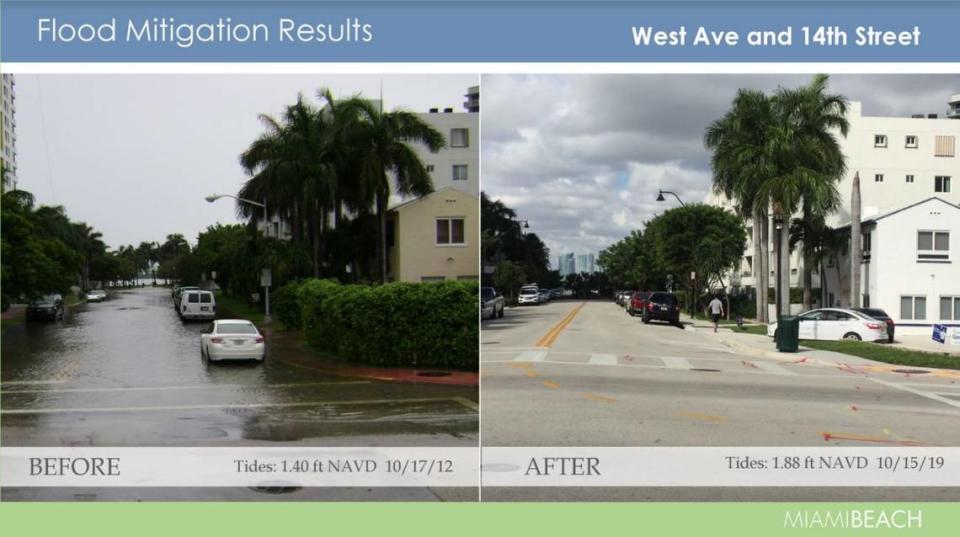
Costs skyrocket amid delays
While Levine’s administration was successful in raising roads in multiple neighborhoods relatively quickly with his “just get it done” approach, the city’s first few projects were highly controversial, in part because higher roads led to flooding of some lower-lying properties.
“We literally ruined their island,” Commissioner Kristen Rosen Gonzalez said of the Palm and Hibiscus project. “Because we didn’t have these discussions.”
The city has since taken a more deliberate approach, including conducting a study that showed property values rose in Sunset Harbour after the road-raising project, and how dozens of floods have been avoided in neighborhoods with elevated streets.
Price tags for the First Street and West Avenue projects have more than doubled amid the slowdown.
The cost of the First Street project, for which construction was estimated at $46 million in 2021, has risen to an expected $178 million. Despite having $35 million in state grant funding for the project, the city now faces a nearly $90 million funding gap, according to a memo from the administration.
Miami Beach has spent $7 million on the design phase, which is considered to be 60% complete.
The West Avenue phase-two project, meanwhile, was first estimated at $44 million. But after a series of change orders expanding the scope and costs, the project is now budgeted at $105 million.
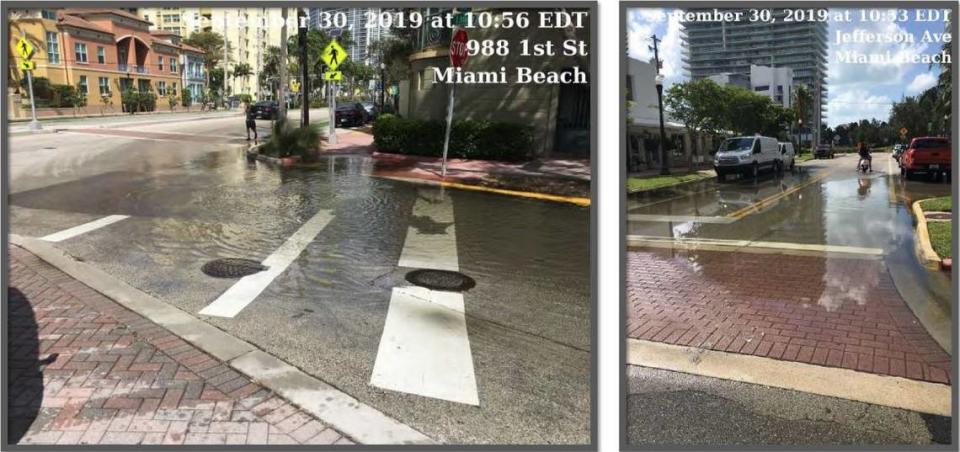
The pushback
Stephan Ginez, who owns Hotel Gaythering in the West Avenue neighborhood, told commissioners Wednesday that “a lot of frustration has built up” over the project because residents “had to fight for every single item.”
That fight has included relocating a pump station, rejecting a fee to connect to the stormwater system, ensuring “harmonization” to prevent the flooding of homes and, now, seeking to limit parking losses.
“It is a constant battle,” Ginez said, though he added he is “optimistic” that the parking issues will be sorted out.
Perhaps the greatest threat to the West Avenue project is the city’s damaged relationship with its contractor, Ric-Man Construction, which sued the city in 2022 over the delays and rising costs. The City Commission on Wednesday authorized the administration to enter into arbitration with the contractor to try to resolve the disputes.
Rosen Gonzalez raised worries about both projects.
She said the First Street project, which contemplates raising the road by about 1.5 feet and installing a 96-inch pipe and a pump station near Washington Avenue to address flooding throughout the South of Fifth neighborhood, would disrupt one of the city’s most successful business corridors.
“This might be, in my opinion, one of the worst decisions we would ever make as a political body to ruin First Street,” Rosen Gonzalez said during Wednesday’s meeting.
The comment drew applause from Galbut, a prominent developer and longtime Miami Beach resident, who later told commissioners that he and his wife built their “dream home” on First Street more than 10 years ago.
Galbut is also the landlord for Papi Steak, a First Street restaurant that is co-owned by Miami nightlife entrepreneur David Grutman. In an interview with the Miami Herald on Wednesday, Galbut said his problems with the resiliency project have “nothing to do” with the restaurant.
“This has to do with our home and the character of our street,” he said.
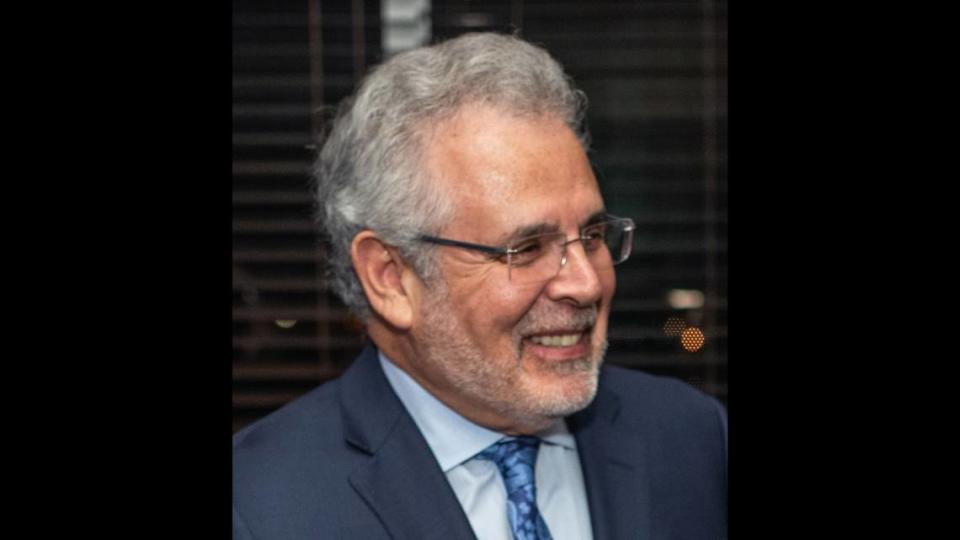
Galbut’s chief issues, he said, include the removal of mature oak trees and the lack of a plan to support the street’s restaurants during construction. In addition to Papi Steak, First Street is home to seafood restaurant Estiatorio Milos and Fogo de Chão Brazilian Steakhouse.
Rather than installing one large pipe that will require the city to “rip up” the entire street, Galbut suggested the city could instead utilize several smaller pipes to limit the disruption.
“There is a solution that should work for everybody,” he said.
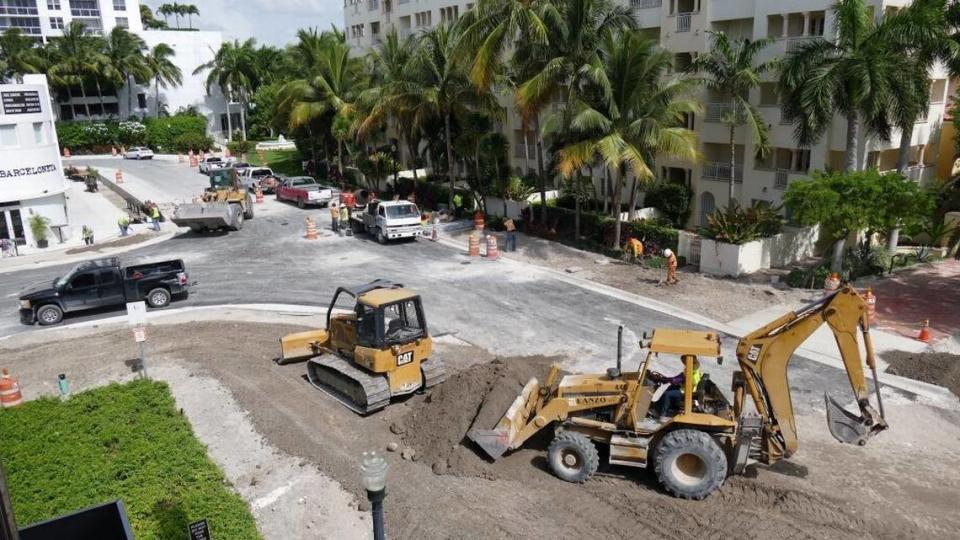
Galbut vs. Grieco
Galbut squared off Wednesday with Mike Grieco, a former Miami Beach city commissioner and state representative who also lives along First Street.
Grieco pointed out that a prior City Commission signed off on details of the project in 2020 and said it should have moved forward long ago.
“You guys cannot kick this can down the road anymore,” he said. “You need to get one project done at some point in our lifetime.”
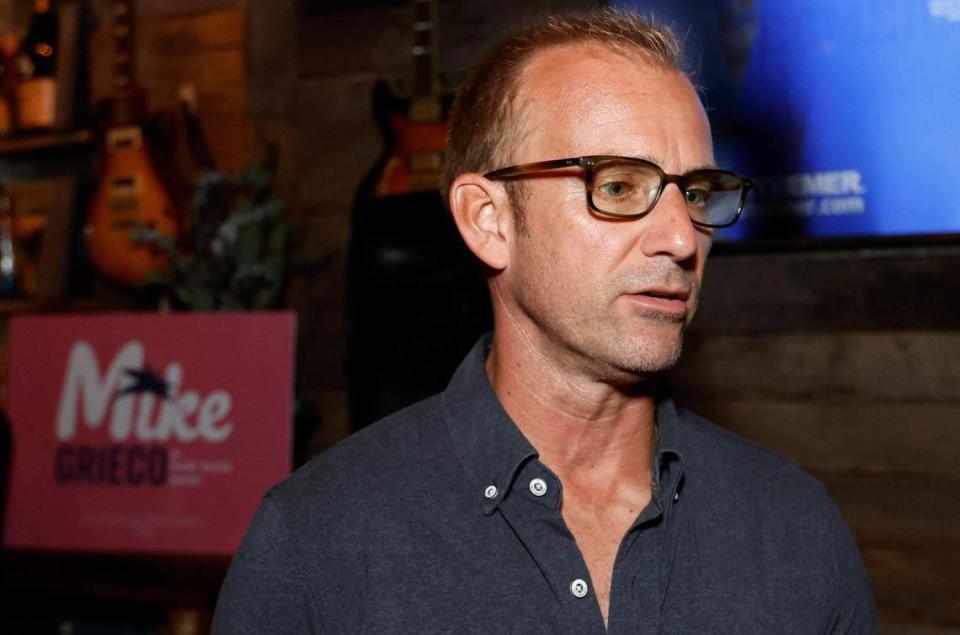
Grieco shared with the Herald an email Galbut had sent him in June 2022, when Grieco was a state representative, in which Galbut outlined a list of items they had discussed related to the project and said he appreciated “how we worked together so well to come up with what is best for the community.”
Their relationship has since soured. In recent text messages Grieco shared with the Herald, Grieco told Galbut that Galbut “broke [his] word” about supporting the project.
“I never agreed to the total destruction of our street and restaurants. Nor would I ever,” Galbut replied.
Several commissioners wondered Wednesday if it would be feasible to relocate the pipe away from First Street. The city’s public works director, Joe Gomez, suggested that could derail the project entirely.
“This has been looked at and re-looked at by our subject matter experts,” Gomez said. “We can look at it, but I want to warn everybody, full transparency ... that it will more than likely require moving the pump station, which is going to be a controversial item, which may end up killing this project.”
Miami Herald Staff Writer Alex Harris contributed to this report.

